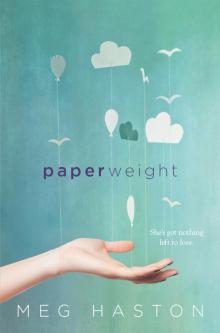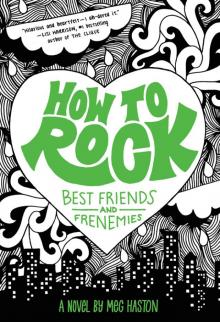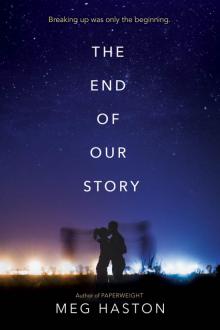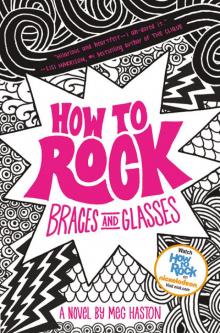- Home
- Meg Haston
The End of Our Story Page 4
The End of Our Story Read online
Page 4
After our third week together, Minna knew everything there was to know about Wil Hines. She says small talk is for small people.
“I ran into Wil’s dad. At Publix, just a few hours before.” A shiver worms down my spine. “He told me to work it out with Wil. To fix it before we graduated.”
“And?” Minna raises her eyebrows, two silvery crescents, and nods toward the board. “If you’re not going to take your turn, I’ll take it for you.”
I nudge my tiles around the board. “And I want to. But I just don’t want to be one of the hundreds of kids who decide to be there for him now that his dad is dead.”
She shakes her head. “Tragedy is a powerful magnetic force. It either draws people in or pushes people away. After a while, the drama will die down, and Wil will see who’s left beside him.”
“It doesn’t feel real,” I tell her.
She tsks. “You’ve got a case of the things like this don’t happen around heres.”
“Things like this don’t happen around here.”
“False,” she says firmly. “Violence happens everywhere, Bridget. It happens behind closed doors and sometimes it happens to people we don’t care about, so we pretend it hasn’t happened at all.”
Minna is the human version of Florida. She is harsh, intense—extreme heat or torrential rains. The lines that map her face, travel her hands, and snake down her neck are packed earth that has been baked under harsh conditions for so long that she has no choice but to crack. But she is strange and lush, too, rich with understanding about the world and how it works or how it doesn’t.
“I should feel sad, like, all the time. But sometimes I feel blank. Like nothing’s happened at all,” I confess.
“Shock,” she says, and she leans across the coffee table, and she rests her hand over mine. “It will fade. And when it does, you’ll know.” She squeezes my hand. Then she slides a few tiles into place. “You lost your turn.”
I glance at the board. BAZOOMS. I roll my eyes.
“You know! Breasts!” she says impatiently. “Twenty points.”
“Minna. Bazooms hasn’t been a word since, like, 1920.”
“I’ll use it in a sentence,” she argues. “Just because Bridget doesn’t have bazooms doesn’t mean they don’t exist.”
I close my eyes and lean into the couch. Just last week Wilson Hines existed, a random collection of atoms blown into life. The calloused hands that rested on Wil’s shoulder. The silvering temples and stern mouth; the jaw muscles that tensed while he examined his newest boat for imperfections.
It is strange and awful to think that Wilson Hines just . . . isn’t, anymore. All because someone else decided to erase him, for no reason at all.
BRIDGE
Spring, Senior Year
WIL still isn’t at school on the following Monday, but the day ticks by as usual: PE and Spanish and Econ and lunch. When teachers call roll, they trip at Wil’s name. And then they say that if we want to talk to a counselor, ours has an office on the third floor—the third floor? They’re pretty sure—and we move on. There are equations to contend with, essays to write.
The halls are bubbling with talk of the murder, only nobody says that word. Everyone uses language that dances around the truth: the accident, the thing with Wil’s dad. It. It’s so sad, it’s so awful, they were nice, a nice family.
People whisper about the cops’ theory: that this man has killed before. According to the paper, Henney’s police statement matches the description of a guy who broke into a house in Neptune Beach, just a few miles away. The woman he attacked was a teacher. Dana York. She worked with a sketch artist at the hospital, describing in excruciating detail the man who had knocked her unconscious before he fled with her mother’s jewelry. Three days later, her injuries killed her. The kids at school pass phones back and forth, zooming in on the sketch of the guy. White, buzz cut, a nose that’s bent a little like it’s been broken. The sketch chills me every time. He looks ordinary. He looks like anyone and no one.
After the last bell, Leigh and I head to the senior courtyard, where Ana has called an emergency class meeting. Senior courtyard is a generous term for a concrete slab that extends outward from the left side of the school. There are a couple of stone benches pushed up against the concrete wall. Since it’s almost summer, somebody’s busted out a Dora the Explorer blow-up pool and a couple of lounge chairs.
As Leigh and I squeeze in, I watch Emilie Simpson hug Ana while Thea Tritt hovers. Buck Travers wanders over to Emilie and flashes a smile whiter than bleached sand. She tosses her hair with unnecessary violence.
My stomach wrings itself out. I still can’t look at Buck—the green mirrored sunglasses wedged on the back of his neck, the SURF LIFE shirt when I know for a fact he’s never touched a surfboard—without feeling generic.
Ana disentangles herself from Emilie and heads to the front of the courtyard. She clears her throat. “Um, hey, guys. I feel like we should talk about what we can do for Wil as a class,” she says, her voice rippling. “I want him to know that we’re thinking about him while he’s gone, and I’m wondering if anybody has any ideas.”
“When is Wil coming back?” asks a girl I recognize from English class.
“Ah—” Ana clasps her hands together. Her voice wavers. “I’m not sure. He’s not ready yet?” Her eyes fill, and Thea rests her hand on Ana’s shoulder.
Everyone is silent, baking under the sun. I shift on my feet. Wil would hate that we’re talking about him when he’s not here, and I wish Ana knew that. I wish she knew what to do without asking: an informal gathering on the beach, maybe, or an afternoon on Wilson’s latest boat. If she’d ask me—I think, and erase the thought before it’s fully formed. Ana would never ask me about Wil. Neither would anybody else in our class. After Ana and Wil started dating, the entire school forgot about Wil and me. It was as if the seven years before had never even happened.
“Maybe we could have a sign-up sheet to bring him dinner. A casserole or something. Or we could send flowers as a class,” Ana says.
“I have to get out of here,” I mutter to Leigh. I don’t want to be here, with these people, talking about casseroles. I need to do something that will actually make a difference. “Call you later.”
I decide to walk. I slip off my shoes and follow the bricked sidewalk, which is rough and just hot enough to feel good. I pass Nina’s Diner and the seafood restaurant with the good tartar sauce Micah eats with a spoon. I move slowly, reading the bricks as I go. They are etched with people’s names or dates or sometimes a quote. Wil and I used to alternate making up stories to go with the bricks on our way to the beach.
I pass IN MEMORY OF KYLIE MITCHELL. In seventh grade, Wil decided that Kylie Mitchell departed this world after a tragic spray-tanning accident left her insides filled with toxic orange goo. I told him that was disgusting, and Kylie Mitchell was probably a sweet old lady who fell asleep painting watercolors and never woke up. That was stupid, he said, because if you think about it, how many old-lady Kylies do you know?
The turnoff for Wil’s is only a few blocks away. The closer I get, the slower I walk. I don’t know what I’m doing. I don’t know what to say or how to say it or whether Wil will want to hear it. I just want to see him. I want to be someone who doesn’t gossip about what happened, someone who knows better. I want to be someone who doesn’t say the word casserole.
When I get to Wil’s street, its blankness surprises me. There are no cop cars or news vans. The crime scene tape is gone.
I cut across the side yard and stand just outside the workshop doors, listening to familiar sounds: the buzz of the circular saw and the electric sander. It sounds like Wilson is in there and for a second I think maybe he could be, until Wil calls, “Come on, Bridge. Everybody knows what happens when you stand in the sun too long.”
I smile a little.
“How’d you know I was here?” I ask, ducking into the shop. Wil is wearing an old HINES T-shirt and shorts, and he’s s
anding a flat piece of wood by hand. I try not to notice his lines beneath the T-shirt; the way they deepen around his chest and arms with every stroke. “Saw you coming through the window.” His voice is quiet. Sad. There’s an old stereo on the floor in the corner of the shop, playing a Beach Boys tune. At the back of the shop, sheets are draped over the long, thin form of a boat.
I stand there, wishing I had flowers or a casserole after all.
Fix it, Brooklyn.
“Is this okay?” I pick at a sore hangnail.
He looks up at me, and I see him taking me in. His face softens; then his Wil wall goes back up. “What?” he says.
“I don’t know.” A thin, dark crescent of blood appears. “Me. Here.”
He keeps sanding. “None of this is okay.”
Fleetwood Mac comes on the radio, a band I know because of Wilson. I take a step toward Wil. I feel him curl inside himself, like he’s afraid of me. “Wil. I’m sorry, okay?”
“You’re always sorry, Bridge. But what does that really even mean?” He flings the words across the table, and I can’t duck in time. “You should”—he sucks the remaining air from the room—“be sorry. It’s like—where were you?” White dust coats his fingertips as he presses the sandpaper harder.
“What?” I force the word past my lips. “I was there. At the funeral?”
“I’m not talking about the funeral!” His expression is a volcano: molten anger and neon sadness exploding from the deepest part of him. “I’m talking about where you’ve been for the last year and a half! You can’t just show up like this!”
My skin goes cold, then hot again. I thought I felt something at the funeral. An opening of the door between us; just the tiniest crack. I thought I saw the light streaming through. But it’s dark again now, and too quiet. The only sounds are Fleetwood Mac and the lullaby of the sandpaper, back and forth. There aren’t enough words in the world to make this okay.
“It’s just . . . I get how much you loved your dad, Wil. I know how close you were.”
“That’s the thing, Bridge.” He finds a hammer. His hand goes pale when he grips it. “You think you know about my family because you hung out over here.” He says the last words slow, waits for them to sink beneath my skin. “You know nothing.”
That’s a lie, I want to say. I know enough to know that Wil has never eaten a casserole in his life. I can imagine the smell of this workshop in three seconds and get it exactly right. I was there when Wilson caught Wil trying his first and last cigarette in eighth grade, and I’ve seen the way Wil’s face goes blank when he’s really mad. Like now. I know plenty.
“I’m sad, too, you know,” I spit at the floor.
“Yeah, well. Sorry for your loss.” Wil drops the hammer and goes back to sanding.
“I just meant that I’m sorry, Wil. Okay? I won’t come back. I just wanted to say sorry.”
I turn away from him, and I’m slow to leave, even though I should be bolting for the door. But it’s the last time we’ll be here like this, just the two of us and real music on the stereo, and I miss us so much that the broken version is better than nothing at all.
WIL
Spring, Junior Year
IT’S been almost three months since Bridge wrecked us. Four days since she stopped trying to repair the damage.
I still feel her staring at the back of my neck in class. But she’s finally stopped apologizing—no more I never should have texts, no more Please, Wils sniffed onto my voice mail. No more notes beneath the workshop door. She evaporated from my life, but like salt film on beach glass, she’s there, and always will be.
She stopped trying because I asked her to, in a note that I slipped through the vents of her locker like we were middle-school kids. I hated how she lived everywhere: in the halls and on my voice mail and scrawled across pages and pages of yellow legal paper. Everything reminded me of who we weren’t anymore. So I asked her to stop, and she did, which was somehow worse.
“Seam needs caulking,” my dad announces. We’re in the workshop, just before sundown. We’ve been working all afternoon and I’m stiff, like my joints are screwed together wrong. Dad is bent over the sweet wooden skiff on the worktable. It’s quiet in here, cool and dark, with the sun filtering through the cracks in the shed, striping his face pink.
“Oakum’s on the bench over there. Want to try feeding it in?” Dad rakes his varnish-stained hands through his hair. It’s pulled back in a ponytail like always. But there’s silver around his temples, and his hairline’s creeping back.
I’m ready to quit for the day, even though we can’t afford that kind of attitude around here. The word money has been seeping through the vents into my room lately, a lot more often than usual. Mom usually brings up college and then Dad says But he doesn’t want—and my mom counters with But one day he might. Maybe if we’d gotten more jobs recently. Maybe if I worked faster.
Still, I’m tired tonight. It will take me forever to sweep up and hang the tools just right. And hell if I’m gonna do it before early-morning crew practice tomorrow. I stop for a second, shake the thought from my head. It’s a Generic Teenager thought, not a Real Me thought.
Sometimes thoughts fly through my head that don’t actually belong to me. Truth is, I don’t mind staying late to clean up. I like how every tool has a hook and how Dad keeps the cord to the stereo wound with a yellow trash tie so nobody trips. I like sweeping the wood dust into straight lines and Skynyrd in the background singing “Simple Man.”
I think Ronnie Van Zant had it right when he wrote that song. It’s a song about how simple is the better way to be. How a guy doesn’t need money or things to be happy, and how bad times will come and go like the waves. That’s just life. As long as a man can look inside himself and be okay with who he is, that’s enough. (Also, it says he should find a woman.)
The idea is right. My dad gets it, but my mom doesn’t. She wants college and a desk job for me. She wants me to have a house that’s bigger than our perfectly good house. She’s told me in millions of little ways since I was a kid. The clothes she buys are name brands from the consignment shop near her work: someone else’s preppy clothes meant for someone else’s pretty life. And this morning she left a University of Florida Gators sweatshirt on my desk next to the third copy of the common app she’s passed my way this month. It’s not even senior year.
Here’s what she doesn’t get: By Skynyrd standards, my life is good. I have a family and a job I’ll love once high school is done. The only part that isn’t there anymore is the woman part, although Ana has been hanging around my locker lately, and she volunteered to help me study for our next science test.
“Any word from Golden Gate?” Dad tries to say it casually. “She hasn’t come around in a while.”
“Dad. Come on.” I get back to work, lifting the thick coils of oakum I’ll use to caulk the seam. I wrap them in a loop from my elbow to my palm and around again. Dad has already set the caulking iron and the mallet on the bench. “I don’t want to talk about her.”
I’m dying to talk about her. It’s the only way to have her here: her name hanging in the air between my dad and me in my favorite place on the planet. But she doesn’t get to be here with us anymore.
I wish I could just get over her. But the awful truth is you don’t just get over a girl like Bridge. She can piss you off and pull your heart out through the soles of your feet, and when she’s gone, there will be this ugly, jagged space in you. You can try to patch it, but you know: You’re a different shape than you were before.
“A girl doesn’t spend nearly every day over here for seven years and just stop for no reason.” Dad keeps his eyes on the boat.
“She’s changed, okay? Reason enough?” My heart is flopping around in my chest like a beached fish. I cram the oakum between two wooden planks, pushing it into the seam with the caulking iron. The material will seal the seam once we finish the process. If I do it right, if I take my time, it will make the boat impenetrable. Nothing will b
e able to touch its insides. I hammer the caulking iron with the mallet. Tiny beads of sweat surface along my hairline.
When I glance up, my dad’s looking at me like I’ve just told him I don’t get Hendrix.
“People don’t change, son.” He gives me a look. “She is who she is. Whatever she’s done to piss you off doesn’t make her a bad person. People aren’t the things they do.”
I hammer harder. I don’t believe him. I think people are exactly the things they do. In sixth grade, I had to do an oral report on Ralph Waldo Emerson. The first thing that came up when I Googled him was this quote: “What you do speaks so loudly that I cannot hear what you say.” If that’s true, Bridge screamed, Fuuucckkk yoooouuu! on the dock that night.
I jump when Dad puts a hand on my shoulder. “Ease up on that mallet,” he orders.
I don’t for a few strokes.
“Drop it, Wil,” Dad says. “Now.” He rubs his hands together and takes a seat in the corner of the shop. He nods at the floor next to him. I sit. He’s solid, and if I could, I’d curl into him.
“You know, son, you and I are the same. We take it hard when someone does wrong by us.”
“I’m not pissed at Bridge,” I say through clenched teeth. “And I don’t want to talk about it anymore.”
“Then what’s the problem?” Dad asks roughly.
“It’s Mom, okay?” I bleat at the walls. I didn’t mean it. I just can’t talk to my dad about Bridge yet. Mom was the very next worry in my head and I didn’t shut my mouth quick enough.
Dad rubs the back of his neck. “Mom.”
“She put this UF sweatshirt out for me this morning, next to another app.” This isn’t her fault. But it’s out there now, and I can’t suck the words back in.
Dad takes a sharp breath.
“It’s not a big deal,” I backpedal. “I just—I don’t know why she cares so much about college.”
“She wants you the hell out of this place.”
His voice sounds like steel, but just in case I say, “Yeah, but I love it here. You know that, right? I want to stay and run the business with you.”

 Paperweight
Paperweight How to Rock Best Friends and Frenemies
How to Rock Best Friends and Frenemies The End of Our Story
The End of Our Story How to Rock Braces and Glasses
How to Rock Braces and Glasses